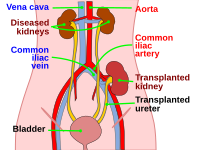
Photo from wikipedia
BACKGROUND Kidney re-transplantation is commonly considered to have a higher immunological risk than first kidney transplantation. Because of the organ shortage and increasing waiting lists, long-term outcomes of kidney re-transplantation… Click to show full abstract
BACKGROUND Kidney re-transplantation is commonly considered to have a higher immunological risk than first kidney transplantation. Because of the organ shortage and increasing waiting lists, long-term outcomes of kidney re-transplantation are being studied. However, reports of re-transplantation outcomes are not common. We have reported our 30 years of experience with second kidney transplantations. METHODS Of 1210 kidney transplantations between November 1982 and August 2016 performed in our hospital, 105 were second kidney transplantations (2nd KT). Living donor KT was 44; deceased donor KT was 61. RESULTS Patient survival rates at 1, 5, and 10 years were 100%, 97.2%, and 90.7%, and graft survival rates were 97.0%, 94.6%, and 71.5%, respectively. The leading cause of graft failure in the 2nd KT was chronic rejection (60%). In addition, induction immunosuppressant, maintenance immunosuppressant, delayed graft function, and graft survival time at the 1st KT had a significant impact on graft survival time at the 2nd KT. CONCLUSIONS Reasonable results in both patient survival and graft survival rates were found in the 2nd KT. Careful monitoring of immunologic risk is needed.
Journal Title: Transplantation proceedings
Year Published: 2017
Link to full text (if available)
Share on Social Media: Sign Up to like & get
recommendations!